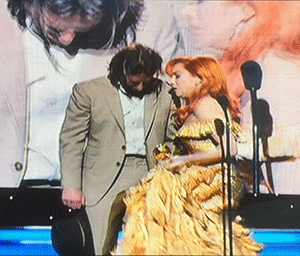
WE’RE OFF THE DEEP END, NOW
Robert Buck and Elizabeth Rogers
“If too much matter is crammed into one place, the cumulative force of gravity becomes overwhelming, and the place becomes an eternal trap, a black hole […] supermassive black holes, which lurk in the centers of galaxies, can be the most luminous objects in the universe.”
– Cover story on the first visible images of a black hole, The New York Times, April 11, 2019
“Nowadays, it is the image. Naming is not enough, one needs to show. So the empire of images is the empire of showing.”
– “The Consistency of the Imaginary: The Power of the Ego” – Marie-Hélène Brousse
“There is so much chemistry between them, it jumps off the screen and runs around all over the place.” “Oh My God! Did you see the way he looked at her?” “I’m obsessed with them! Have you seen them on…”
– Pieces of conversations overheard about A Star Is Born
ALL THE WORLD’S A STAGE
In 2018, a man and a woman remade a movie in an attempt to circumscribe again what cannot be said of the sexual real. Bradley Cooper directed and starred with Lady Gaga in A Star Is Born, the fourth revision in a musical romance series that began in 1937. The closer one looks at the 21st Century iteration, the more one apprehends the real that refracts through it. The trajectory of Gaga’s character, Ally, bisects the narrative, from her isolation in the opening title sequence to her solitude in the austere closing shot. In the former, she walks an alley way alone at night, as the title slowly fades across her onscreen body. But the words fail to capture. . . She continues to move with abandon towards an unseen vanishing point on the horizon. In the latter, her face is framed in the void of an otherwise black screen. What happens in between the two moments generates jouissance that overflows the frame––story, stages and screens alike. It is Ally, a woman, who is able via her voice, art, image and body––and the love-bond she makes with a man––to hold the stage and beyond, to navigate the deluge.
A STAR IS DEAD
No longer covered by reality, the real is now on stage. This emergence is represented in a scene in which Ally accepts a Grammy Award for Best New Artist with her country rock star husband Jackson Maine, portrayed by Cooper, at her side onstage. Wasted, he pisses himself. She moves to cover the stain seeping down the inside of his thigh with her gold lamé gown. He cannot ‘hold it’. It is because the real is now on the stage that the film effectively blurs distinctions between acting out and the passage-to-the-act. Ultimately, the only stage Jackson is able to hold is the one held by his absence. Both Jackson and Cooper poetically stage his death scene, framing and elevating his suicide, by pills and hanging, through the ‘proscenium arch’ of his garage door. The death of the male protagonist is a foregone conclusion within the series. What sets Jackson’s death apart is the inescapable push-to-jouir of later capitalism, whose conduit is the massive proliferation of images. He cannot contain the excessive pressures of jouissance; in death he becomes one with it. This is precipitated when Ally’s talent agent shows up at the house, where Jackson greets him clean, just out of the shower. He pointedly tells Jackson to get out of the way, the self-abuse will return and he will consequently destroy Ally’s career. The capitalist has no regard for love. She, love, is Jackson’s last consistency. In death, the superstar becomes a black hole.
FIX
He cannot fix anything. The father can’t be located. His father’s body has been displaced from its burial plot, and his attempts to install a father throughout the film by way of his manager-brother, a rehab counselor, and a good friend and best man fail. His endeavor to make of Ally a limit, a symptom-as-name-of-the-father, falters when her talent agent begins orchestrating the multiplying looks she assumes and the circulation of her image. He can’t get enough of a fix, abusing alcohol, prescription narcotics and steroid injections. Nor can he get fixed. He performs, marries Ally, checks into rehab… ‘Fixes’ that soon fail to fix. Most importantly, all along, he’s unable to fix Ally. He wants her to be ‘authentic’, to stop the proliferation of her image and speak her ‘truth’. He first encounters her on stage as Édith Piaf in a drag queen bar, a place of excess––prosthetics, performativity, masquerade, sliding. After leaving the drag bar, they go to a dive bar, and wind up in a parking lot. They are alone, and Ally spontaneously sings to him: “Tell me something, boy. Aren’t you tired of tryin’ to fill that void? Or do you need more? Aren’t you tired of keeping it so hardcore?” He asks, “Is that me?” She answers, “That’s you.” She sings to him again, lyrics she wrote days before: “I’m off the deep end, watch as I dive in; I’ll never meet the ground; Crash through the surface, where they can’t hurt us: We’re far from the shallow now.” He falls for her in this ‘place’, and it is in this ‘place’ where she speaks her ‘truth’ that he needs to keep her. He’s fixated on her.
LOOKS
There are three riveting gazes Ally makes that index her relay to the film’s end. The first occurs at the drag club when she performs, in a mise-en-abîme of masquerade––Lady Gaga-as-Ally-as-drag queen-as-Édith Piaf––and stares alluringly into the camera, cinematically Jackson’s point-of-view. But given the artistic collaboration that is the film, this is also Gaga gazing at Cooper. The second happens on a balcony at the Chateau Marmont in West Hollywood, where a billboard of Ally’s face and name loom over the scene. Here, before she takes a concert stage, he says ‘meaningful’ things to her: “If you don’t dig deep into your fucking soul, you won’t have legs. I’m just telling you that if you don’t tell the truth out there, you’re fucked. All you got is you and what you want to say to people.” She listens, but stares intently into the distance, away from both Jackson and Cooper, beyond the story, stage and screen frame. Her third look closes the film. Now a widow, she sings on a Carnegie Hall-like stage a song Jackson wrote for her, “I’ll Never Love Again”. Her performance is punctuated by flashbacks of the couple in a loving and hopeful exchange at a piano, before the moment of her talent agent’s tragic intervention. What concludes the triad of looks is a close-up of her, not as drag queen, pop star, wife or daughter. Auditorium, orchestra, audience and stage are gone. In the final frames, we are confronted to her alone, solitary against the blackness of a void, tears, gazing beyond us, through the camera and Cooper behind it. A woman and her solitude.
ALL OVER THE PLACE
The convergence of images, jouissance, and stages that constitute and surround A Star Is Born are what makes it so compelling and slippery. The current rendition was created of a world awash in images, and it is this world that it reflects, and back into which it disseminates its own fount of images. Images, and the jouissance they conduct, are all over the place, impossible to contain. Even as we write, we find ourselves caught in something akin to an undertow. Googling the film’s title, we’re served a sea of them––production stills, movie posters, screen grabs, DVD packaging, press photos, the star couple posing lovingly for the cameras. Meta-worlds of make-believe and marketing. Is it Ally and Jackson or Gaga and Cooper, or both? Live, recorded, and projected images splash across and slide about the innumerable stages on screen. Stages that are set, literally or figuratively, in the film are then reconfigured in the world via TV interviews, promotional tours, talk shows, award ceremonies, Cooper’s impromptu appearances at Lady Gaga’s concerts, and so on. And the actor-couple deploy and command the power of the look! Coursing through this flood is the love-bond: capitalized, exploited, romanticized, enjoyed––it’s a cause.
ONE NOSE
She knows. Ally’s nose is a leitmotif in the film. She first calls attention to it in the dive bar. To emphasize her observation, “Almost every single person that I have come into contact with in the music industry has told me that my nose is too big, and that I won’t make it,” she runs her finger down the bridge of her nose. After he asks to touch it, Jackson slowly traces the contour of her nose. Cooper distills the eroticism of the gesture with close-ups, a slower film-speed, and the amplification of a blues lyric coming from the bar jukebox, “Lord, I feel like I’m dying.” When she says, “I could have a hit song if not for my nose,” he responds with more words about talent and truth and having something to say. “Don’t you understand what I’m trying to tell you?” She answers, “Yeah, I do. I don’t like it, but I understand it.” Later, on the hotel balcony with her in his arms, looking at the billboard of her face and name, he says, “The whole thing should be your fucking nose.” She laughs, “My nose is so ridiculous!” As she leaves their bedroom, in what becomes her final goodbye to him, she runs her finger down her nose. In this moment, with this gesture, words are unnecessary. It is in the gesture as such… She is the poem.
“Listen, it is because I dove into the abyss that I am beginning to love the abyss I am made of.” – Clarice Lispector, from The Passion According to G.H. (1964)
Robert Buck and Elizabeth Rogers © 2019
Download
.png)


